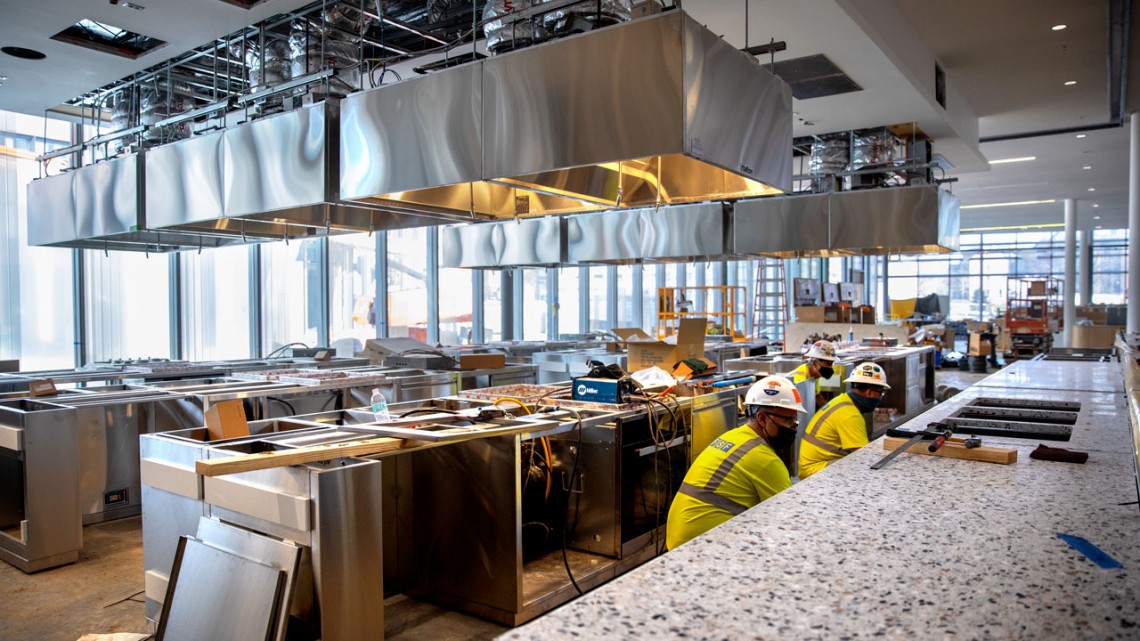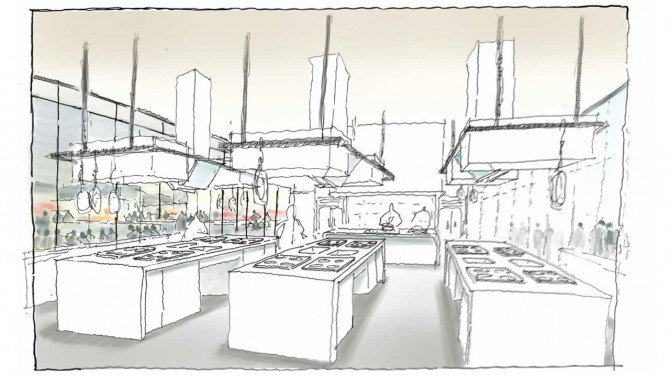
Workers install equipment in the future Discovery Kitchen, a glass-walled teaching kitchen featured prominently inside the North Campus Residential Expansion dining hall.
North Campus kitchen to cultivate culinary, dietetic discovery
By James Dean
As they drop in for meals or pass through on tours, visitors to the North Campus Residential Expansion's (NCRE) sprawling 1,000-seat dining hall might pause to observe white-coated students or staff testing recipes inside a glass-enclosed kitchen.
Working at the dozen sleek cooking elements providing up to 24 stations might be a meeting of Food for Contemporary Living, a popular class required for future dietitians, or university chefs honing their skills or fine-tuning a fresh pasta dish alongside nutrition researchers.
Welcome to the Discovery Kitchen, a state-of the-art teaching kitchen now under construction through a partnership between Cornell Dining and the Division of Nutritional Sciences (DNS). The partners expect their shared lab to enhance menus, dietary education and food literacy across campus, and hope the kitchen classroom’s prominent placement in the university’s newest residential community highlights the connections between food and research, living and learning.
“We all need to understand the role of nutrition in human health and well-being, and it’s exciting for undergraduates to be introduced to this topic,” said Patricia Cassano, the Alan D. Mathios Professor and director of DNS. “But to be able to do it in the context of the cutting-edge Discovery Kitchen will open up new possibilities that we’ve never had before.”
Dustin Cutler, executive director of Cornell Dining in Student and Campus Life, called the facility a game-changer for his 1,000-person organization.
“This collaboration will help grow awareness of Dining’s commitment around culinary innovation, nutrition and sustainability,” he said, “and allow us to enhance and build upon those efforts.”
For DNS, the kitchen modernizes and replaces a capability displaced by renovations to Martha Van Rensselaer Hall, which could no longer accommodate a food lab. Dining and the NCRE emerged as ideal partners for a new facility, said Kristine Mahoney, director of facilities and operations for the College of Human Ecology, which houses DNS jointly with the College of Agriculture and Life Sciences.
“The stars aligned, and everyone is so excited about this,” Mahoney said. “It’s a really amazing opportunity and incredible partnership.”
The new location offers improved accessibility, modern technology – instructor demonstrations will be streamed over monitors, for example, instead of reflected in a large mirror – and a higher profile. Visible from inside the eatery and from a busy walkway outside, the Discovery Kitchen’s design is intentionally transparent, the partners said, inviting curiosity about food preparation and healthy eating.
“Students enjoy eating and want to learn more about how to prepare foods,” said Emily Gier, associate professor of practice and dietetic internship director for DNS. “I expect that appeal to widen once they can see students having the lab experience.”
In addition to Food for Contemporary Living, which attracts a long waitlist each semester, students might see peers in classes such as Community Nutrition in Action, focused on cost-effective meals, or Applied Dietetics and Food Service Systems – a course that partners with Dining to produce themed dinners each spring.
Opening as soon as fall 2021, the Discovery Kitchen will come online as DNS begins demonstrating a new model of graduate dietetics instruction, recognized by its accrediting body, that places more emphasis on experiential learning. Cassano and Gier also envision the kitchen supporting new courses in emerging areas such as sustainable diets and medical nutrition therapy.
For Dining, the Discovery Kitchen will provide a base for year-round training previously squeezed into brief periods of summer downtime. It will support special events, such as during alumni or trustee weekends, and community outreach. And Cutler is eager to showcase Dining’s partnership with DNS and other researchers to help shape healthy, sustainable menus, including through the Menus of Change initiative. Recipes tested and perfected in the Discovery Kitchen, he said, will make their way to Dining’s residence and retail sites.
“We really wanted to show that we’re working closely with academics,” he said, “as we continue to look at the food system for the future.”
The Discovery Kitchen may serve another function, Cutler said, for the students who will frequent the NCRE dining facility – making them feel more at home, since kitchens are often a focal point of family activity.
“It will be used for research and development and for academics,” he said, “but it’s also strategic in the sense of making it feel like there’s a kitchen in the center of your community, which will bring all types of people together to celebrate food.”
The kitchen will advance a process of culinary and nutritional discovery championed at Cornell since Martha Van Rensselaer and Flora Rose helped pioneer education in those areas more than a century ago.
“It definitely rings true to Martha and Flora’s early vision about the importance of nutrition education,” Gier said, “just doing it more in a modern way.”
Learn more about the North Campus Residential Expansion, including progress of the Discovery Kitchen, at NCRE.cornell.edu and sign up to receive the monthly project newsletter.
Media Contact
Get Cornell news delivered right to your inbox.
Subscribe

